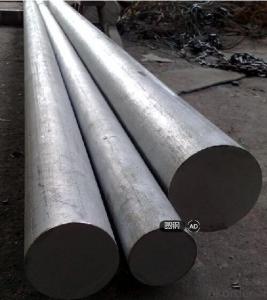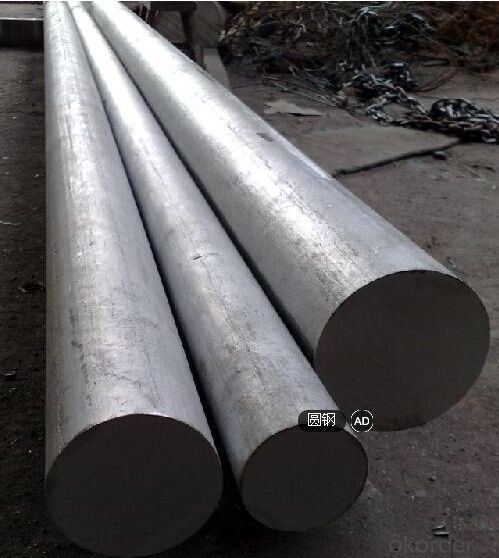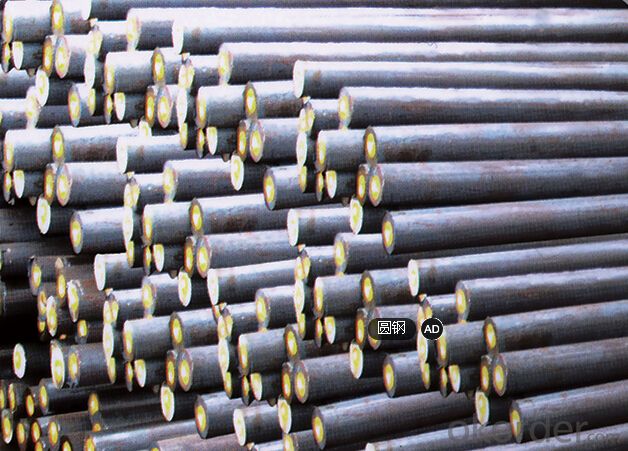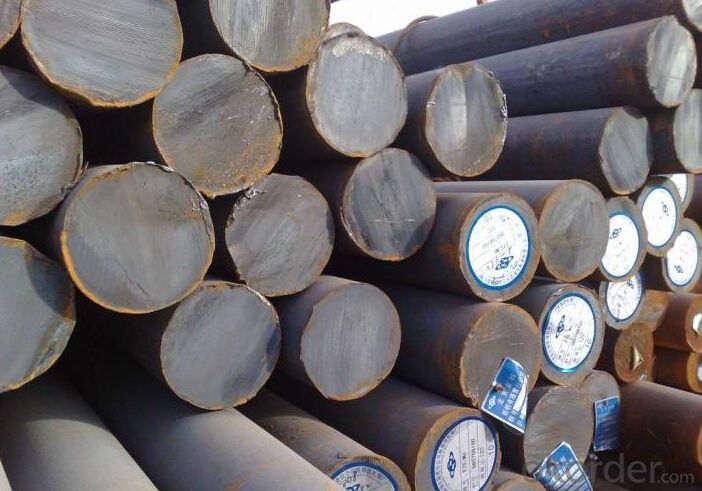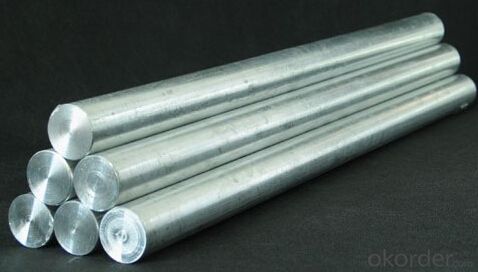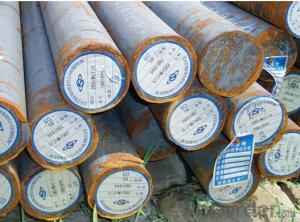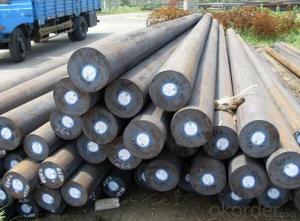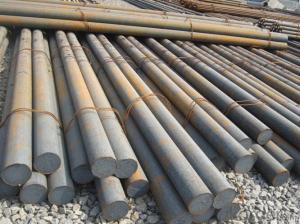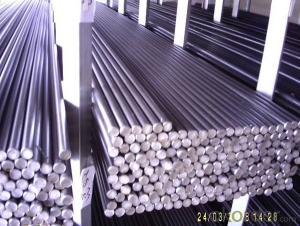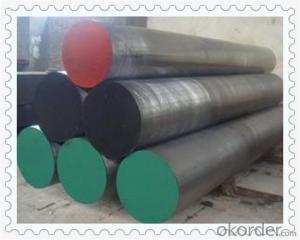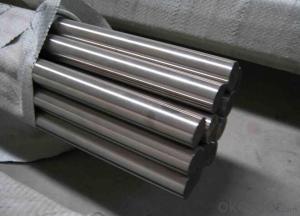4130 Steel Rod/4130 Steel Bar/Alloy Steel Bar
- Loading Port:
- Qingdao
- Payment Terms:
- TT OR LC
- Min Order Qty:
- 5 m.t.
- Supply Capability:
- 100000 m.t./month
OKorder Service Pledge
Quality Product, Order Online Tracking, Timely Delivery
OKorder Financial Service
Credit Rating, Credit Services, Credit Purchasing
You Might Also Like
Specification
Type:
Carbon Steel,Spring Steel,Bearing Steel,Gear Steel,Deformed Steel,Stainless Steel,Alloy Steel
Shape:
Steel Coil,Steel Sheet,Steel Wire Rod,Steel Flat Bar,Steel Square Bar,Steel Angle,Steel Round Bar,Steel Billets
Technique:
Hot Rolled,Cold Rolled,Cold Drawn,ERW,Forged,Saw,Extruded,EFW,Spring
Surface Treatment:
Galvanized,Coated,Copper Coated,Color Coated,Oiled,Dry,Chromed Passivation,Polished,Bright,Black,PVDF Coated
Certification:
ISO,SGS,BV,IBR,RoHS,CE,API,BSI,UL
Thickness:
4mm-800mm
Width:
4mm-800mm
Length:
6-12m
Outer Diameter:
4mm-800mm
Net Weight:
100kg
Packaging:
seaworthy packaging
4130 Steel Rod/4130 Steel Bar/Alloy Steel Bar
Detailed Information of 4130 Steel Rod/4130 Steel Bar/Alloy Steel Bar
| Name | Steel Round Bar |
| Shape | Round Bar/Square Bar/Flat Bar/Plate/Wire |
| Standard | GB/ASTM/SAE/AISI/DIN/JIS/EN/BS |
| Surface Treatment: | Black/Peeling/Polished/Machined |
| Delivery Condition: | Hot Rolled or Forged/Peeled or Black Surface |
| Test | SGS/UT 100% Elements Testing |
| Certificate: | ISO/Mill Certificate |
| Service: | 24 hours online service / |
| more than 20 years trading and manufacture | |
| Quality Assurance: | the third party inspection, such as SGS, BV, TUV…etc. is acceptable |
| Packaging Details: | Seaworthy Packaging or as per customer's packing instruction |
Product Overviews of 4130 Steel Rod/4130 Steel Bar/Alloy Steel Bar
| Product Name | Typical Grades | Diameter(mm) | Standard Adopted |
| Carbon Steel | 20 (1020/S20C/C22) | ||
| 40 (1040/S40C/C40) | Ø16-Ø300 | ||
| 45 (1045/S45C/C45) | |||
| Bearing Steel | GCr9 (51100/SUJ1) | ||
| GCr15 (52100/SUJ2/100Gr6) | Ø12-Ø250 | ||
| GCr9SiMn (A485-Gr.1/SUJ3) | GB/SAE/ | ||
| Cr-Mo Steel | 20Cr (5120/SCr420H/20Cr4) | JIS/DIN | |
| 40Cr (5140/SCr440/41Cr4) | Ø12-Ø250 | ||
| 42CrMo(4140/SCM440/42CrMo4) | |||
| Gear Steel | 20CrNiMo | ||
| 20CrMn(5115/SMnC420/20MnCr5) | Ø16-Ø600 | ||
| 20CrNiMo(8620/SNCM220/20CrMiMo2) |
Company Introduction of 4130 Steel Rod/4130 Steel Bar/Alloy Steel Bar
CNBM International Corporation is the most import and export platform of CNBM group(China National Building Material Group Corporation) ,which is a state-owned enterprise, ranked in 270th of Fortune Global 500 in 2015.
With its advantages, CNBM International are mainly concentrate on Cement, Glass, Iron and Steel, Ceramics industries and devotes herself for supplying high quality series of refractories as well as technical consultancies and logistics solution.
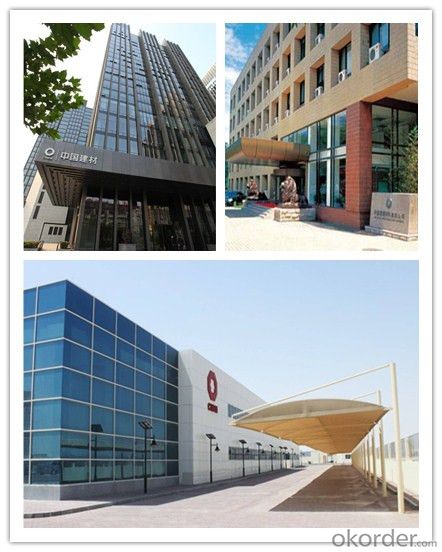
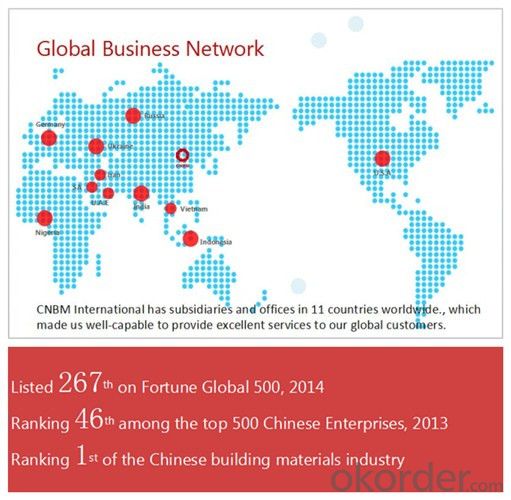
| After-sale service | l CNBM provides the services and support you need for every step of our cooperation. We’re the business partners you can trust; you can relax and get on with doing business. |
| l For any problem, please kindly contact us at any your convenient time, we’ll reply you in our first priority within 24 hours | |
| Advantages | l Industry experience over 20 years. |
| l Shipment of goods -More than 70 countries worldwide. | |
| l The most convenient transport and prompt delivery. | |
| l Competitive price with best service. | |
| l High technical production line with top quality products. | |
| l High reputation based on best quality products. | |
Packaging & Delivery of 4130 Steel Rod/4130 Steel Bar/Alloy Steel Bar
| Packaging Detail | Sea worthy packing /as per customer's packing instruction |
| Delivery Detail | 15 ~ 40 days after receiving the deposit |
Products Show
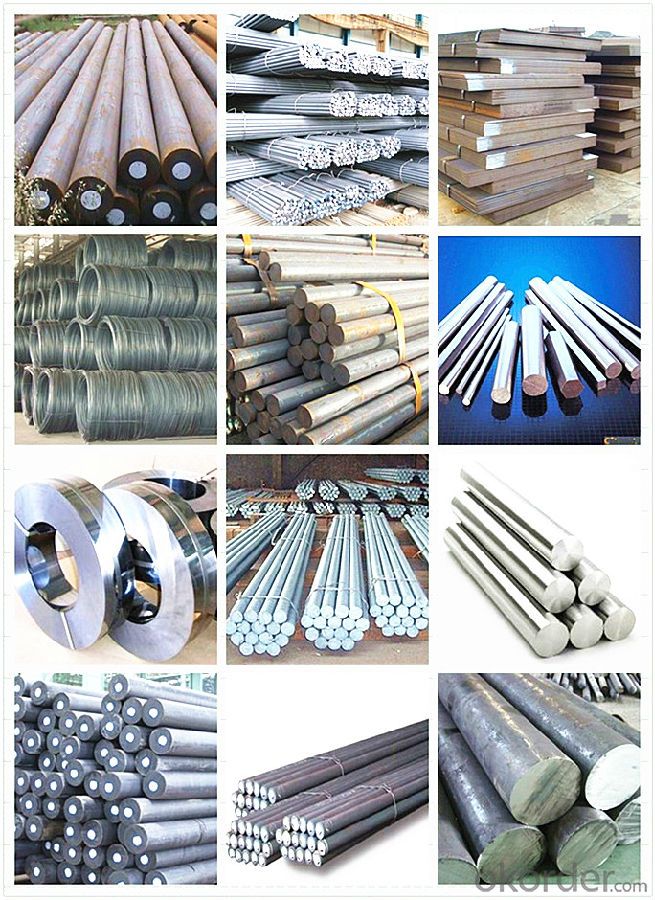
FAQ:
| Are you a trading company or manufacturer? | Manufacturer |
| What’s the MOQ? | 1000m2 |
| What’s your delivery time? | 15-20 days after downpayment received |
| Do you Accept OEM service? | Yes |
| what’s your delivery terms? | FOB/CFR/CIF |
| What's the Payment Terms? | 30% as deposit,70% before shipment by T/T |
| Western Union acceptable for small amount. | |
| L/C acceptable for large amount. | |
| Scrow ,Paybal,Alipay are also ok | |
| Why choose us? | Chose happens because of quality, then price, We can give you both. Additionally, we can also offer professional products inquiry, products knowledge train (for agents), smooth goods delivery, excellent customer solution proposals. |
| What's your available port of Shipment? | Main Port, China |
| What’s your featured services? | Our service formula: good quality+ good price+ good service=customer's trust |
| Where are your Market? | Covering more than 160 countries in the world |
- Q: What are the different methods of surface honing for special steel?
- There are several different methods of surface honing for special steel, each with its own advantages and applications. Some of the most commonly used methods include: 1. Manual Honing: This method involves using hand-held honing tools such as stones, sticks, or abrasive pads to manually remove material from the surface of the special steel. Manual honing allows for precise control and is often used for smaller or intricate parts. 2. Machine Honing: Machine honing utilizes specialized honing machines that automate the honing process. These machines typically consist of rotating honing stones or abrasive belts that remove material from the surface of the steel. Machine honing is often preferred for larger or more complex parts, as it can achieve consistent and high-quality results. 3. Diamond Honing: Diamond honing is a method that uses diamond abrasives to remove material from the surface of the special steel. Diamond is one of the hardest substances known, making it highly effective for honing steel. This method is often used for high-precision applications or when a very smooth surface finish is required. 4. Superfinishing: Superfinishing is a specialized honing process that is used to achieve extremely fine surface finishes on special steel. It involves using a combination of honing stones and abrasive pastes to remove microscopically small amounts of material from the surface. Superfinishing is typically used for critical applications where surface roughness and dimensional accuracy are of utmost importance. 5. Lapping: Lapping is a honing method that uses a combination of abrasive particles and a rotating or vibrating tool to remove material from the surface of the steel. It is often used for parts that require a very flat or parallel surface, such as bearings or sealing surfaces. 6. Electrochemical Honing: Electrochemical honing is a specialized honing process that uses an electric current to remove material from the surface of the special steel. It is often used for complex or hard-to-reach surfaces, as it can effectively remove material from areas that are difficult to access with other honing methods. In summary, the different methods of surface honing for special steel include manual honing, machine honing, diamond honing, superfinishing, lapping, and electrochemical honing. Each method has its own unique advantages and applications, allowing for precise control and achieving the desired surface finish and dimensional accuracy for special steel components.
- Q: How does stainless steel contribute to the production of medical implants?
- Stainless steel contributes to the production of medical implants by providing a highly durable and corrosion-resistant material that is compatible with the human body. It is used in various implants such as joint replacements, dental implants, and surgical instruments due to its strength, biocompatibility, and ability to withstand sterilization processes.
- Q: How does tool and die steel maintain its hardness and wear resistance?
- Tool and die steel maintains its hardness and wear resistance through a combination of factors, including its composition and heat treatment. It is typically made from high-carbon and high-chromium alloys, which provide inherent hardness and resistance to wear. Additionally, the steel is subjected to a specific heat treatment process, such as quenching and tempering, which further enhances its hardness and toughness. This combination of composition and heat treatment allows the tool and die steel to withstand the high pressures, repeated impacts, and abrasive forces encountered in tooling and die applications, thus maintaining its hardness and wear resistance over time.
- Q: How is high-temperature steel used in the production of furnace components?
- High-temperature steel is used in the production of furnace components due to its exceptional heat resistance and strength. This type of steel can withstand extreme temperatures without losing its structural integrity, making it ideal for lining furnace walls, constructing heating elements, and manufacturing other critical parts that are exposed to intense heat.
- Q: What are the different surface hardening techniques for special steel parts?
- Special steel parts can undergo various surface hardening techniques, each with its own advantages and characteristics. Some commonly used techniques include: 1. Carburizing: This technique involves heating the steel part in a carbon-rich atmosphere to introduce carbon into its surface. The result is a hardened outer layer with high carbon content, while the core remains tough and ductile. Carburizing improves wear resistance and overall strength. 2. Nitriding: Nitriding diffuses nitrogen into the steel part's surface, forming nitrides. This creates a hard and wear-resistant surface layer with improved fatigue strength. Nitriding can be done at lower temperatures, reducing the risk of distortion or dimensional changes. 3. Induction Hardening: By using high-frequency induction heating, this technique selectively heats the steel part's surface. Rapid quenching follows, resulting in a hardened outer layer. With induction hardening, precise control over hardened depth is possible, and it can be applied to specific areas to enhance wear resistance and strength. 4. Flame Hardening: Here, the steel part's surface is heated using an oxy-acetylene or oxy-propane flame. Quick quenching follows, leading to a hardened surface layer. Flame hardening is commonly used for large or irregularly shaped parts, offering excellent wear resistance. 5. Laser Hardening: This technique utilizes a high-intensity laser beam to heat and rapidly cool the steel part's surface. It allows precise control over the hardened area and depth, minimizing distortion and maintaining tight tolerances. Laser hardening is particularly effective for small, complex parts or localized hardening requirements. By choosing the appropriate method, manufacturers can enhance the durability, strength, and performance of special steel parts in diverse applications.
- Q: How does special steel contribute to reducing product weight?
- Special steel contributes to reducing product weight through its unique properties such as high strength, durability, and lightweight composition. By using special steel in the manufacturing process, designers can optimize the strength-to-weight ratio of the product, allowing for thinner and lighter components without compromising on performance or safety. This reduction in weight not only enhances the efficiency and performance of the product but also reduces material and transportation costs, making it a valuable solution in various industries.
- Q: How is special steel used in the production of automotive springs?
- Special steel is used in the production of automotive springs due to its high strength and durability properties, which are essential for supporting the weight of the vehicle and providing a smooth ride. The special steel's unique composition and manufacturing processes ensure that the springs can withstand repeated stress and maintain their shape over time, enhancing the overall performance and safety of the vehicle.
- Q: How does special steel perform in high-temperature corrosion resistance?
- Special steel is renowned for its outstanding performance in resisting corrosion at high temperatures. It is specifically crafted to endure harsh circumstances and maintain its integrity even when exposed to elevated temperatures. The composition of special steel incorporates various alloying elements, including chromium, nickel, molybdenum, and others, which enhance its resistance to corrosion in high-temperature settings. When subjected to high temperatures, numerous materials have a tendency to oxidize or react with the surrounding environment, resulting in corrosion and deterioration. However, special steel develops a protective oxide layer on its surface, serving as a barrier against corrosive elements. This oxide layer, primarily composed of chromium, remains stable and possesses self-repairing properties, effectively preventing further corrosion and upholding the structural integrity of the steel. Moreover, the incorporation of alloying elements like molybdenum enhances the steel's ability to resist pitting and crevice corrosion, which are commonly observed in high-temperature environments. Special steel also exhibits exceptional mechanical properties even at elevated temperatures, ensuring structural stability and preventing deformation or failure under stress. Additionally, special steel is frequently subjected to heat treatment to bolster its resistance to corrosion at high temperatures. Heat treatment processes such as annealing, tempering, or quenching and tempering optimize the steel's microstructure and mechanical properties, rendering it more impervious to corrosion in extreme conditions. In conclusion, special steel excels in its ability to resist corrosion at high temperatures due to its distinct composition, protective oxide layer, and heat treatment procedures. It is a dependable and long-lasting material choice for applications that involve exposure to elevated temperatures and corrosive environments, such as in chemical processing plants, power generation facilities, or oil and gas refineries.
- Q: What are the main advantages of using special steel in aerospace applications?
- The main advantages of using special steel in aerospace applications are its superior strength, toughness, and corrosion resistance. Special steel can withstand extreme temperatures and pressures, making it suitable for critical components such as engine parts and landing gear. Its high strength-to-weight ratio allows for lighter aircraft designs, improving fuel efficiency and performance. Additionally, special steel's excellent fatigue resistance ensures the long-term reliability and safety of aerospace structures.
- Q: Can special steel be used in the food processing industry?
- Yes, special steel can be used in the food processing industry. Special steel alloys, such as stainless steel, are commonly used in food processing equipment and machinery due to their corrosion resistance, durability, and hygiene properties. These steel alloys provide a reliable and safe material for handling and processing food, making them an ideal choice for the industry.
Send your message to us
4130 Steel Rod/4130 Steel Bar/Alloy Steel Bar
- Loading Port:
- Qingdao
- Payment Terms:
- TT OR LC
- Min Order Qty:
- 5 m.t.
- Supply Capability:
- 100000 m.t./month
OKorder Service Pledge
Quality Product, Order Online Tracking, Timely Delivery
OKorder Financial Service
Credit Rating, Credit Services, Credit Purchasing
Similar products
Hot products
Hot Searches
Related keywords
